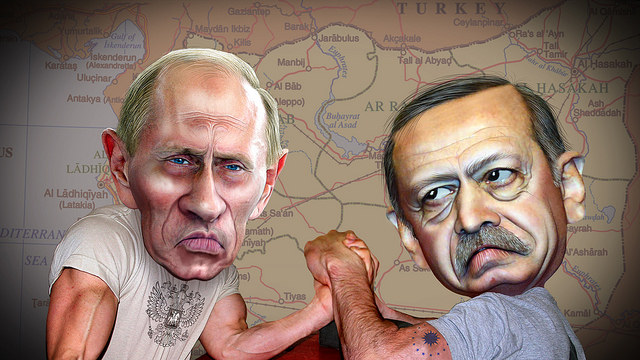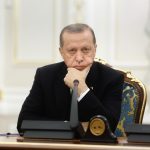by Eldar Mamedov
In remarks on December 11 intended to increase pressure on Turkey, President Vladimir Putin ordered Russia’s military to act in an “extremely tough way” in Syria to protect Russian forces attacking Islamic State (ISIS or IS) targets. “Any targets threatening our military group or land infrastructure must be immediately destroyed,” Putin said, speaking at a Defense Ministry event.
This comes a week after Putin addressed the Federal Assembly of Russia and devoted some very harsh words to his Turkish counterpart Recep Tayyip Erdogan. Putin held the Turkish leadership directly responsible for the downing of the Russian warplane SU-24 and the death of Russian servicemen. He vowed revenge that would go beyond economic sanctions against Turkey.
Russians see the ambush of their plane not as an isolated incident, but as part of a deeper, more far-reaching provocation. The SU-24 may not be central in this regard. It is about how Russia sees its role in Syria and beyond.
Russian Motivations
Many explanations have been put forward concerning Moscow’s motivations in Syria. Typically they revolve around Putin’s need to bolster his domestic standing, his penchant for challenging the West in every possible way, and even his supposed weakness for fellow dictators.
None of these stands up to close scrutiny. Given his domestic popularity, Putin does not need to enhance his popularity by engaging in military operations abroad. The “anti-West” argument also does not hold: Russia was very helpful in the nuclear negotiations with Iran, which have resulted in the most significant foreign policy achievement of the Obama administration to date. When Russia opposes Western policies, it does so not so much out of principle but because it finds those policies inefficient and counter-productive and feels it has a better alternative to offer.
For example, Russia is highly critical of the West´s interventions in Iraq and Libya not because of some bizarre fetish for dictators, but because the decapitation of these regimes led to the collapse of the whole state apparatus. Extremists have filled the resulting void and created new terrorist havens. The wish to avoid a repetition of such a scenario, and not a commitment to save Bashar Assad personally, is what drives Russian policy in Syria.
Russia has good reasons to fear the expansion and consolidation of a jihadist foothold in Syria and Iraq. Thousands of Russian citizens are known to be fighting with the Islamic State (IS or ISIS) and the Al-Nusra Front in Syria. The pool of their sympathizers and potential recruits in Russia is much wider. Add to this the citizens of Central Asian states, with whom Russia has visa-free regimes, and Russian motivation in destroying these jihadists and preventing Syria from becoming a launching pad for attacks on Russia proper becomes clear. Russia has legitimate security concerns in Syria.
Russia is skeptical of the Western claim that in order to expedite the defeat of IS, Assad has to go first. To suggest that once Assad is gone, the array of “moderate” jihadists” would turn against IS is a leap of faith. It is even less probable that groups like Ahrar al-Sham, which the West sometimes touts as just such relatively “moderate jihadists,” would turn on Al-Nusra, the Syrian franchise of al-Qaeda. Ahrar al-Sham not only shares the same extreme Salafist ideology, but it also works with Al-Nusra under the umbrella of the “Army of Conquest.”
It is telling that Ahrar al-Sham’s leaders refused to endorse the deal reached at a conference of the Syrian opposition in Riyadh on December 10 calling for a common position in peace negotiations on Syria. The group’s bigwigs made clear that they want an extreme Salafist state, not a democratic Syria, to replace Assad´s dictatorship. This disqualifies them as part of any solution in Syria and vindicates the Russian view that some non-IS rebels are not very different from IS itself. Western criticisms that Russia focuses mostly on non-IS rebels thus resonate little in Moscow.
Conflict with Turkey
In this context, Russia views Turkish support for the very groups that Russia seeks to destroy as directly undermining Russian policy goals and security interests. Yet, even though Russia was perfectly aware of this support going back to 2011, its policy towards Turkey was highly compartmentalized. Bilateral relations were booming in such areas as trade, energy, tourism, construction, and so on. And, as the Vienna negotiations on Syria went on, Moscow courted Ankara in the hopes that it would play a constructive role in the talks. Putin even invited Erdogan to Moscow to attend the opening of Europe’s largest mosque. This is why Turkey’s downing of the Russian plane ignited a deep sense of betrayal in Moscow. Once the Russians concluded that Erdogan was irredeemable, the gloves came off and Russians sought international support by exposing his alleged links to the illegal oil trade with IS.
The potential for the escalation of tensions is high. Turkey is reportedly obstructing Russian ships sailing through the Bosphorus and the Dardanelles in contravention of the spirit of the Montreux convention regulating international passage through the Turkish straights. Turkey’s moves into northern Iraq—and subsequent calls by the Iraqi government and the Grand Ayatollah Ali Sistani demanding their withdrawal—have set the stage for a wider conflict: Russia might well consider intervening on Baghdad´s behalf if asked to do so by the government. This would have the additional strategic benefit, from Moscow´s point of view, of accelerating Iraq’s drift toward the Russian-Iranian-Syrian-Hezbollah “axis of resistance.”
Russian behavior so far demonstrates that attempts to marginalize Moscow or impose solutions that it sees as contradicting its national interests only further strengthen Moscow’s resolve to stay the course in Syria. After the downing of the SU-24, Russia intensified the bombings of the so-called “Turkmen fighters” to the point that northern Syria has now become a de-facto no-fly zone for Turkish jets. And as Putin’s latest remarks to the Defense Ministry suggest, Russia will keep fighting all whom it, not the West, considers terrorists for as long as it takes to defeat them.
The best the West can do in this situation is to try to accommodate Russia rather than challenge it. The risks of waging a proxy war against Russia in Syria far outweigh the potential benefits for the West. If Russia and its allies prevail in Syria, it won’t signify a strategic defeat for the West. Russia defends what it sees as its legitimate interests in Syria, but it is not trying to eject the Americans, the French, and the British from their military bases in the Persian Gulf. The Russian presence also has the effect of limiting its Iranian ally’s potentially hostile behavior toward Israel.
Russia under Putin may be a prickly nationalist power, but making a deal with it (and Iran) would be preferable for the West than fighting essentially on behalf of its Gulf allies and Turkey. After all, the attacks in Paris and San Bernardino show once again that neither Russia nor Iran is a direct threat to the West in the way that some Western “allies” are when they spread the Wahhabist extremism that feeds IS and al-Qaeda. Turkey’s downing of the Russian plane made the Vienna talks on Syria more difficult. But it is now more urgent than ever to resume these talks and abandon any notion that excluding Russia will somehow advance the cause of peace in the region.
Image of Vladimir Putin and Recep Tayyip Erdogan courtesy of Donkey Hotey via Flickr.
This article reflects the personal views of the author and not necessarily the opinions of the European Parliament.






What are the Russians doing in Syria? One thing that jumps to the top of the list is they have thrown a monkey wrench into somebody’s regime change plans.
Thanks for the incisive article.
Russian intervention is constructive and will prevent a total chaos post Assad. It will limit the role of Saudi Arabia and Turkey, the backers of the extremist forces in Syria. However, the biggest task for the world community to combat terrorism is to combat spread of Islamic terrorist ideology by Saudi Arabia supported Wahhabi-Salafi version of Islam.